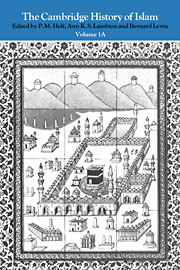Book contents
- Frontmatter
- Introduction
- Part I The rise and domination of the Arabs
- Part II The coming of the steppe peoples
- Part III The central Islamic lands in the Ottoman period
- 1 The rise of the Ottoman empire
- 2 The heyday and decline of the Ottoman empire
- 3 The later Ottoman empire in Rumelia and Anatolia
- 4 The later Ottoman empire in Egypt and the fertile crescent
- 5 Safavid Persia
- 6 Persia: the breakdown of society
- 7 Central Asia from the sixteenth century to the Russian conquests
- Appendix The Golden Horde and its successors
- 8 Tsarist Russia and the Muslims of central Asia
8 - Tsarist Russia and the Muslims of central Asia
from Part III - The central Islamic lands in the Ottoman period
Published online by Cambridge University Press: 28 March 2008
- Frontmatter
- Introduction
- Part I The rise and domination of the Arabs
- Part II The coming of the steppe peoples
- Part III The central Islamic lands in the Ottoman period
- 1 The rise of the Ottoman empire
- 2 The heyday and decline of the Ottoman empire
- 3 The later Ottoman empire in Rumelia and Anatolia
- 4 The later Ottoman empire in Egypt and the fertile crescent
- 5 Safavid Persia
- 6 Persia: the breakdown of society
- 7 Central Asia from the sixteenth century to the Russian conquests
- Appendix The Golden Horde and its successors
- 8 Tsarist Russia and the Muslims of central Asia
Summary
The Russian advance into the Kazakh steppes
The Kazakhs originated as tribal groups which broke away from the hegemony of the Shaybanid, Abu'l-Khayr Khān, in about 870/1465-6, and fled to the Chu river in the Semirech'ye region, where they were protected by the khan of Mughulistān, Esen Bogha. After the death of Abu'l-Khayr in 873/1468, their nomadic area spread westwards, and they were joined by other Turkish groups. They wandered along the Chu and Talas rivers during the conquests of Muhammad Shaybānī Khān (d. 916/1510), and gained control of the region between the Issiq Köl and the Ural river. This vast area was divided into three parts, to provide suitable grounds for three nomadic groups. The nomads of the Yedi-Su (Semirech'ye) region were called the Greater Horde, those between the Irtysh and the Jaxartes the Middle Horde, those further west the Lesser Horde. The Kipchak, Naiman and Kungrat tribes, which subsequently played an important part in the history of Khīva, Bukhārā and Khokand, were all members of the Middle Horde. The Kazakh tribes, who were somewhat superficially islamized, sometimes united under a strong khan, but separated again after his death.
Relations between the Kazakh khans and chiefs and the Russians start soon after Ivan the Terrible occupied Kazan khanate (959/1552) and the banks of the Volga. The cities of Tümen, Tobol'sk, Tara and Tomsk, which the Russians founded after they occupied western Siberia, were places on the route of trade with the Kazakhs. The city of Tobol'sk had a special importance in this respect.
- Type
- Chapter
- Information
- The Cambridge History of Islam , pp. 503 - 526Publisher: Cambridge University PressPrint publication year: 1977
- 1
- Cited by



